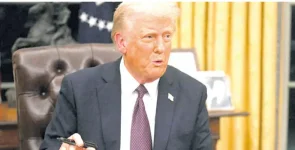African Nations Face Health Crisis as US Exits WHO.
African countries must find new health funding after the United States announced its departure from the World Health Organization.
The withdrawal threatens critical health programs across Africa, according to Moussa Faki Mahamat, Chairman of the African Union Commission. He asked US President Donald Trump to reverse the decision, citing risks to key initiatives like the Africa Centers for Disease Control and Prevention.
The CDC works with WHO to detect and respond to health emergencies across the continent. Major programs fighting HIV/AIDS, tuberculosis, and malaria - long supported by US initiatives like PEPFAR - stand at risk.
China emerges as a potential partner to fill this gap. At the September 2024 China-Africa Cooperation Summit, President Xi Jinping presented plans to strengthen partnerships in trade, health, and other sectors.
China's record shows promise in African healthcare support. During the 2014 West African Ebola outbreak, China sent medical workers and supplies. Similar aid reached Angola during its 2016 yellow fever crisis and Madagascar's 2017 plague outbreak. Chinese teams also helped combat Ebola in Uganda and Burundi from 2018 to 2020.
Chinese companies provide vital medical supplies to Africa. Their firms produce antimalarial drugs and contraceptive technology, which is distributed across the continent.
African leaders plan to meet in February 2025 under Rwandan President Paul Kagame's leadership. The agenda includes finding new health funding sources and reducing dependence on foreign aid.
China's growing role in Africa spans infrastructure, economic growth, and public health. Through programs like the Belt and Road Initiative, China offers funding, expertise, and technology to African nations.
The Chinese government pledged ongoing WHO support and deeper international health partnerships. Their Ministry of Foreign Affairs backs WHO's central role in global health leadership.
This shift presents both challenges and opportunities for African nations. Leaders must strengthen local health systems and secure sustainable funding sources. Building stronger partnerships with China and other nations could help create improved healthcare across Africa.
African countries must find new health funding after the United States announced its departure from the World Health Organization.
The withdrawal threatens critical health programs across Africa, according to Moussa Faki Mahamat, Chairman of the African Union Commission. He asked US President Donald Trump to reverse the decision, citing risks to key initiatives like the Africa Centers for Disease Control and Prevention.
The CDC works with WHO to detect and respond to health emergencies across the continent. Major programs fighting HIV/AIDS, tuberculosis, and malaria - long supported by US initiatives like PEPFAR - stand at risk.
China emerges as a potential partner to fill this gap. At the September 2024 China-Africa Cooperation Summit, President Xi Jinping presented plans to strengthen partnerships in trade, health, and other sectors.
China's record shows promise in African healthcare support. During the 2014 West African Ebola outbreak, China sent medical workers and supplies. Similar aid reached Angola during its 2016 yellow fever crisis and Madagascar's 2017 plague outbreak. Chinese teams also helped combat Ebola in Uganda and Burundi from 2018 to 2020.
Chinese companies provide vital medical supplies to Africa. Their firms produce antimalarial drugs and contraceptive technology, which is distributed across the continent.
African leaders plan to meet in February 2025 under Rwandan President Paul Kagame's leadership. The agenda includes finding new health funding sources and reducing dependence on foreign aid.
China's growing role in Africa spans infrastructure, economic growth, and public health. Through programs like the Belt and Road Initiative, China offers funding, expertise, and technology to African nations.
The Chinese government pledged ongoing WHO support and deeper international health partnerships. Their Ministry of Foreign Affairs backs WHO's central role in global health leadership.
This shift presents both challenges and opportunities for African nations. Leaders must strengthen local health systems and secure sustainable funding sources. Building stronger partnerships with China and other nations could help create improved healthcare across Africa.












